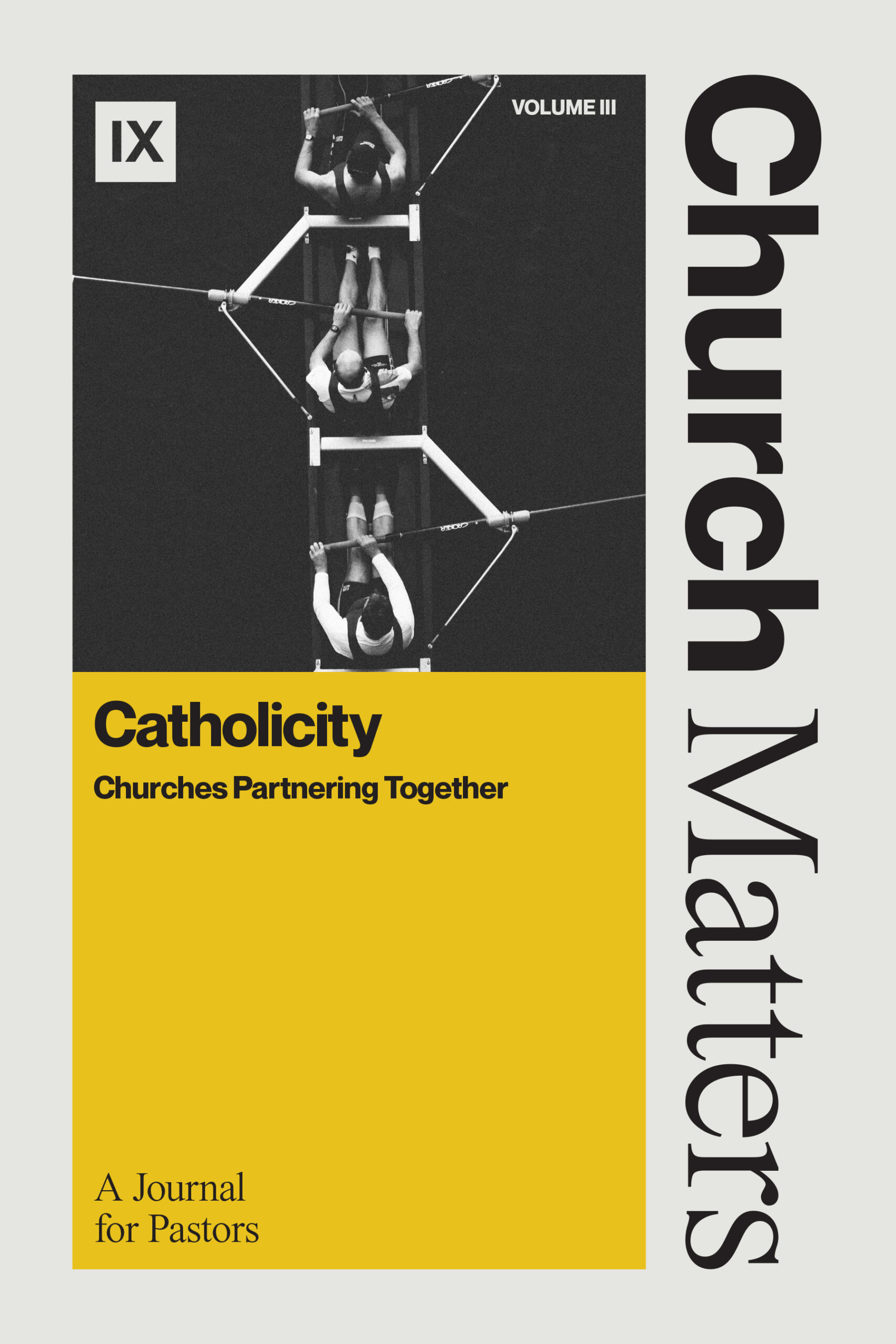When Catholicity Leads to Compromise
Catholicity, or universality, is an attribute of Christ’s church that reflects the nature of God. God is “from everlasting to everlasting” (Ps. 90:2). God is geographically inescapable (Ps. 139:7–8). His gospel saves all who repent and believe across all time and space. Hence, his kingdom, by its very nature, is universal. The Nicene-Constantinopolitan Creed (AD 381) famously defines the church not just as one, holy, and apostolic, but also as catholic. This catholicity is gospel-endorsing. It is Protestant. It is virtuous.
Such virtuous catholicity is evidenced today as local churches maintain good relationships with one another. As I have written previously, gospel-preaching churches must recognise that they are on the same team.[1] Partnering with other local churches often aids gospel proclamation and doctrinal fortification.
Catholicity is also beautifully expressed within individual local churches when its members welcome, befriend, and disciple people from different backgrounds, when our songs display breadth across history and culture, and when we hold the appropriate theological convictions loosely.
CATHOLICITY: A VEHICLE FOR COMPROMISE
Nevertheless, for all the good of catholicity, an over-realized catholicity is potentially poisonous. I caution us all to beware of the following three catholicity-based compromises:
1. Compromising Gospel Doctrine
When I told my unbelieving English grandmother that I was considering pastoral ministry, she replied, “Oh, so you’re going to be a future Billy Graham, are you?!” I can’t recall exactly how I responded, but I remember being thankful she’d heard many of Graham’s sermons. I did want to be a future Billy Graham. I wanted to preach the gospel to as many people as possible and to people just like her.
A few months later, though, as I listened to an elderly Billy Graham (then in his late seventies), speak about the future of Christianity, I was astounded to hear him say:
I think everybody who loves Christ, or knows Christ, whether they’re conscious of it or not, they are members of the body of Christ. . . . They may not even know the name of Jesus, but they know in their heart that they need something . . . and I think that they are saved.[2]
How could such an evidently godly man seemingly undermine the exclusive message he had spent a lifetime faithfully proclaiming? Iain Murray, historian and assistant to Martyn Lloyd-Jones when Graham was in his heyday, offers an explanation: “A lack of apprehension of danger, a determination only to be charitable, and an increasing commitment to ecumenicalism, were to corrode Graham’s convictions.”[3]
In short, Graham’s catholicity muddied his message over time. In his late thirties, when preaching the gospel at Cambridge University, a senior liberal theologian noted that he could not agree with Graham’s sermon. Instead of emphasising Christ’s exclusivity, Graham replied, “We are all Christians.”[4]This growing catholic resolve—undoubtedly coupled with admirable desire for more to hear the gospel—caused him to begin to partner with people who did not preach it.[5] Graham began to unwisely speak of being “equally at home in an Anglican or Baptist or Roman Catholic Church.”[6] No wonder that, in that infamous interview with Robert Schuller, the elderly Graham was caught parroting his message. Beware of the pitfall of compromising the gospel message to include all who call themselves Christian.
2. Compromising Gospel Imperatives
Yet there is a second subtler way that catholicity can compromise the gospel. Many fervent evangelicals, who would never deny that Jesus is the only way to the Father (John 14:6), still refuse to uncouple themselves from compromised ecclesiastical structures because they believe that doing so better reflects the church’s universality.
For example, some evangelicals encourage people not to leave theologically-mixed denominations because “it is a devilish false dichotomy to think diversity and faithfulness to Scripture and the Lord Jesus cannot and should not co-exist.”[7] On one level this statement is true. Diversity is commendable. All churches should pray for diversity across age, ethnicity, race, and cultural background.
But diversity has limits. Indeed, why continue to tether yourself to a church where celebrated diversity is seen in some of its members upholding gospel imperatives and some of its members denying gospel imperatives? Why stay in a church where the gospel imperative of repentance (which characterizes those who will inherit the kingdom of God—Mark 1:15; 1 Cor. 6:9–10, Gal. 5:21, Eph. 5:5; cf. 1 Pet. 2:24) is confused, compromised, or cast off by so many of its leaders? Why persist in a church where the root of the gospel is so severed from its fruit? Why remain when the stakes are so high for both non-Christian observers and Christian ministers alike?
Many ministers (including dear friends of mine) align themselves with gospel-compromised denominations and therefore often find themselves in one of the following situations: they shipwreck their faith having been influenced by the heresy around them; they choose to stay silent on certain sins, believing it’s loving to refer to “shades of grey”; or, if they hold fast to the gospel imperative of repentance, they find themselves without a job, ultimately spat out by their own denomination. Is the price of this type of catholicity worth it?
Similarly, other gospel ministers cheerfully share platforms at Christian conferences with speakers who proclaim Jesus as loving Saviour, but not as righteous Lord (insofar as the latter group denies the necessity of repentance for certain sins). The desire to speak at such conferences is usually grounded in the desire to display greater catholicity, but catholicity never asks us to deny the imperatives of the gospel.
Some seasoned ministers may indeed have the strength to stand apart from unfaithful voyagers in their own denomination (or conference). But many weaker seafarers, who follow their lead, find themselves swayed by those who deny gospel imperatives. As Proverbs warns, “The friends of fools suffer harm” (Prov. 13:20). No wonder Paul, who labored for a precious catholicity by exhorting churches to support one another, also did so by exhorting his readers to “turn from,” “avoid,” “not associate with,” and “not partner with” false teachers and those who deny the call to repentance (e.g. 1 Tim. 6:20–21, Rom. 16:17–18, 1 Cor. 5:11, Eph. 5:6–7).
If we ultimately worship the catholicity of the church, we commit treason against its King.
3. Compromising Gospel Churches
Thirdly, and certainly most subtly, catholicity may risk compromising the gospel when gospel-preaching churches fail to carefully consider who belongs to their church. This normally occurs when churches show little concern for practices concerning the ordinances (baptism and the Lord’s Supper) and church membership.
No doubt, many evangelicals will sigh at the mere suggestion of such secondary things putting the gospel in jeopardy. After all, if a church gets gospel doctrine (belief in Christ alone) right, and gospel imperatives (repentance) correct, then by definition it is a true church. Why concern ourselves with ecclesiological matters? Just preach the gospel, right?
However, the Bible regularly speaks to these matters because over time the who of the church reveals the what of the gospel. The one being baptized this Sunday may be a future church leader who is baptising others in years to come. The one who takes the Lord’s Supper for the first time this week may be one who fences the table decades down the line. The newly admitted church member of today will define the church member of tomorrow. Consequently, what happens when a church (often in an admirable desire to just get the gospel out) gives little or no thought to who belongs to its membership or who partakes of its ordinances? Over time, the church, Christ’s kingdom of light, is no longer that ‘city on a hill’ (Matt. 5:14).
How then does catholicity account for the differing convictions that Christians possess on these secondary issues? After all, whilst credobaptist congregationalists like me sincerely believe that these biblical practices protect the gospel over time, my Presbyterian paedobaptist brothers and sisters believe their practices do.
True catholicity, therefore, does not demand that every individual Christian be able to join any church he or she pleases. It allows paedobaptists to follow their convictions in their churches and credobaptists to follow their convictions in their churches. Yet it also requires those churches who disagree on secondary issues to extend the hand of fellowship to one another in other ways. For instance, we can happily pray that their church grows and holds fast to the gospel, even as we recognize that it’s a good thing our church isn’t collapsed into theirs.
The larger point here is our catholicity can become compromised and lead to compromised churches when we fail to heed what the Bible teaches about who the church is and how it should be defined.
CONCLUSION
All who love Christ’s church must pray for greater wisdom. All who love the gospel must pray for a greater sense of the virtuousness of catholicity. And yet in an era where marginalized believers look for as many allies as possible, I fear more of us might need to pray that our catholicity doesn’t become a vehicle for compromise.
* * * * *
[1] Jonathan Worsley, “Maintain a Good Relationship with Christians from Other Churches” https://www.9marks.org/article/maintain-a-good-relationship-with-christians-from-other-churches/
[2] Televised interview of Billy Graham by Robert Schuller, The Hour of Power (circa May 1997)
[3] Iain Murray, Evangelicalism Divided, p. 66, Banner of Truth (2000)
[4] William Martin, A Prophet with Honor: The Billy Graham Story, p. 190, William Morrow (1991)
[5] In 1970, Graham shared a White House Service with the Roman Catholic Cardinal John Krol. In 1974, Graham asked liberal Anglican Archbishop Michael Ramsey (who did not believe in the substitutionary atonement of Christ) to give the opening address at his Rio de Janeiro crusade. In 1987, Graham agreed to share a worship service in Columbia, South Carolina with the Pope John Paul II. Indeed, Billy Graham biographer, William Martin, wrote, ‘increasingly, and particularly after extensive co–operation with liberal state churches in England, Scotland, and on the Continent, Graham came to accept, then to welcome, then virtually to require, the co-operation of all but the most flagrantly Modernist Protestant groups, such as Unitarians, or such bodies as Mormons and Jehovah’s Witnesses.’ Martin, Prophet with Honor: The Billy Graham Story, p. 218
[6] David Frost, Billy Graham in Conversation with David Frost, p. 68, Lion Publishing (1998)
[7] Matthew Sleeman, Don’t Leave, https://www.oakhill.ac.uk/resources/news-and-blog/post/75-donat-leave
Related Multimedia

On Local Churches and Sending Agencies (Missions Talk, Ep. 34)
By J. Mack Stiles, Ryan Robertson









